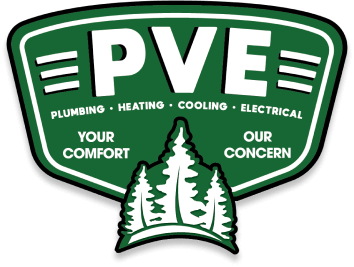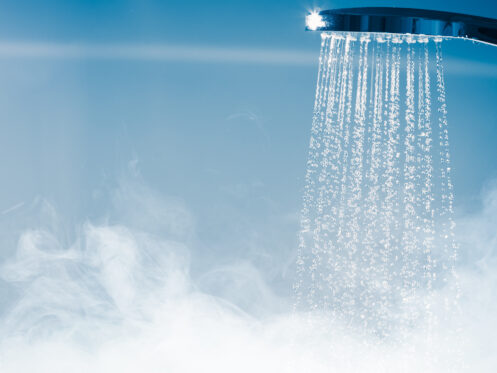Low water pressure is a frustrating problem that can adversely impact your quality of life. Whether you’re taking a shower or washing dishes by hand, low water flow makes it difficult to finish these tasks efficiently. If you have a strict schedule, even a 10-minute delay is noticeable. Low water pressure is a common issue that has many potential causes and remedies.
Potential Causes of Low Water Pressure
From corrosion to leaks, there are many reasons why the water pressure from your faucets and showerheads might drop. Once you know what’s causing this problem, you can figure out how to fix it.
Corroded Pipes
While plumbing pipes use materials that can last for decades, they all experience wear and tear eventually. Copper and brass pipes shouldn’t corrode for at least 40 to 50 years. However, galvanized steel can start to corrode after just 20 years.
If you have a vintage home that was built decades in the past, there’s a higher chance that you have corroded pipes. Consider checking the county records for your home to determine if a previous owner repiped the property.
Corrosion takes place when oxidation develops on pipe walls. Eventually, the pathways narrow, which can restrict the flow of water. Along with corrosion, scale buildup can occur on the pipe walls. If you sek plumbing solutions that can reduce or eliminate the corrosion, holes might develop in the piping material.
Water Shutoff Valve Issues
The water that flows into your home is regulated by a water shutoff valve. If you start experiencing low water pressure, it’s possible that the valve isn’t fully open. This is a simple issue with a quick and easy fix. However, valves can become stuck, which can make it more difficult to open them. There are also different types of valves, such as a lever-type and a wheel-type. The type of valve determines which method the plumber uses to open it.
Clogged Pipes
While clogs often occur in drains, they can also develop deep in piping. Even a small obstruction can limit the water pressure in your home. Avoid using chemicals to reduce clogs. These substances can damage the pipe materials and weaken the structural integrity of your plumbing system.
Leaking Pipes
Plumbing leaks aren’t always easy to detect. If your plumbing system has a large leak, your foundation or basement might flood. On the other hand, the damage from a small leak can go unnoticed if you don’t know where to look. It can take weeks or months for a minor leak to cause visible damage.
However, leaks almost immediately impact water pressure. If you notice a change in the pressure that comes out of your faucets or showerheads, a leak might be the cause. If you know where your pipes are located, look around them for any signs of pooling water or wet spots. When you request assistance from a plumber, they’ll turn your water supply off before inspecting the system. The solution a plumber uses to deal with a leak depends on the size of it.
Water Supplier Problems
There are times when low water pressure isn’t caused by a problem on your property or in your home. Your water provider might have temporary problems with regulating the water pressure. If you’re close with your neighbors, ask them if they’re having the same issues. If you aren’t the only one in your area to be affected, call your water supply company to request an update on when they might restore the water pressure.
Shared Pipelines
The pipelines under your property might be shared with your neighbor. When they wash their dishes or take a shower, you might experience a drop in water pressure. If your pipelines are shared, the water supply will be divided between multiple households. Consider changing your schedule and daily routine if you believe that a neighbor is using a lot of water at the same time as you are.
Inadequate Installation or Renovation
If you have water pressure issues immediately after moving into a new home, the cause might be an inadequate installation. It’s possible that the diameter of your pipes is too small to support the flow rate in your home. This problem can also occur during renovations if you don’t correctly size the pipes.
Damaged Fixtures
If the low water pressure in your home is confined to a single faucet, the fixture itself might be damaged. For example, faucets come with aerators that are able to effectively limit the volume of water without negatively impacting the pressure. However, scale and dirt can clog the aerator if you don’t regularly clean it. Aerators are typically easy to remove and clean by hand. Keep in mind that the fixture itself can become clogged as well, which is more difficult to clean.
Fixes for Low Water Pressure
Once you identify the cause of low water pressure in your home, you can determine the severity of the problem and the required solution.
Removing Clogs
There are several options for clearing clogs in pipes. If you receive hard water in your home, scale accumulation can cause clogging issues. Plumbers can clear clogs once they know where they are. For example, a clog deeper in the plumbing system might require a different solution from one near the top of the drain. Along with plungers and augers, plumbers can use hydro-jetting equipment to get rid of stubborn clogs.
Replacing or Repairing Fixtures
If you only have low water pressure in a single faucet, you might need to replace the fixture altogether. If hard water routinely accumulates in faucet aerators, you can mitigate the source of this problem by installing a water softener. The purpose of a softener is to treat the water before it enters your home or leaves a faucet. By softening your water, you’ll also benefit from cleaner hair and less soap scum on your dishes.
Cleaning Corrosion
If you believe that some of your pipes are corroded, the solution depends on the age of your plumbing system. For example, let’s say that your pipes are already 50 years old. Replacing your pipes might be the more cost-effective option. If the corrosion isn’t that bad, you may be able to fix the problem by having the plumbing system cleaned. Keep in mind that not fixing corrosion can lead to sizable leaks and cracks, which can cause significant water damage.
Sealing Leaks
When you have a leak in your plumbing system, it will need to be sealed to effectively minimize the water damage. Plumbers detect water leaks with video drain inspections. Epoxy putty is regularly used for smaller leaks.
Do you have low water pressure in your Belchertown home? At Pioneer Valley Environmental, our team offers plumbing maintenance, repair, and inspection services. Whether you have a leaky pipe or a faulty shutoff valve, we’ll identify the crux of the issue and provide efficient and reliable repairs. Our solutions also include plumbing installation services. Call us at Pioneer Valley Environmental in Ware, MA today to book our plumbing services anywhere in this general area.








